
Social media platforms may restrict organic growth to favor paid advertisements or even disappear altogether, but Search Engine Optimization (SEO) is one strategy you can always rely on! The free SEO tools listed in this guide will help you optimize your WordPress site in a variety of ways.
The good news is that there’s no need to heed the call of snake-oil SEO salesmen, especially when there are so many outstanding free SEO tools that can have a positive impact on your rankings – as long as you’re willing to take a little time to learn their ins and outs.
In this post, we’ve assembled a collection of seven free SEO tools for WordPress (and otherwise) to help improve your Google rankings. What’s more, you’ll get advice on how to use them, so that you can improve your chances of reaching the very top of the SERP (search engine results page).
Let’s get started!
- Pingdom Speed Test
- KWFinder
- Chrome DevTools
- SimilarWeb
- Google Keyword Planner
- Google Trends
- Keywords Everywhere
1. Pingdom Speed Test

Pingdom Speed Test is a simple free tool that measures exactly how long your site takes to load – down to the millisecond. Just enter the URL of the site you want to test, pick one of the available server locations, then sit back for a few seconds while it produces a detailed report.
Aside from load speeds, Pingdom will also compare how your site stacks up against their database and archived tests, and provide you with a list of performance insights you can put into action to improve your metrics:
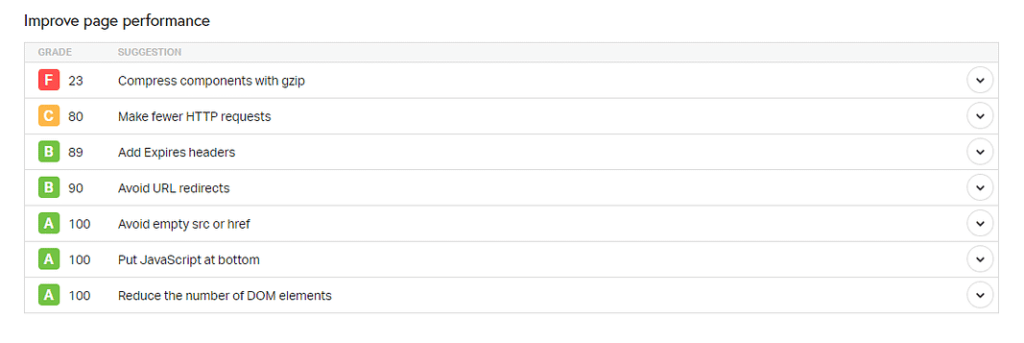
Now, you might not care too much about how fast your site loads as long as it’s quick enough, but search engines do. So, if you want to boost your Google rankings, even shaving a couple of milliseconds off your page speed might just be the ticket to get there.
As far as WordPress goes, there are lots of ways to help improve your page speed times, and we recently covered ten of them in a two-part series: 5 Quick Wins to Speed Up WordPress Load Times and 5 More Quick Wins to Speed Up Your WordPress.
2. KWFinder

KWFinder allows you to search for detailed information about specific keywords. All you need to do is enter a seed keyword into the search bar, click “Find Keywords”, and wait a few seconds for this free SEO tool to calculate your results.
KWFinder reports show you how popular the keyword you’re searching for is, how the popularity of that keyword has changed over time, and related keywords you might want to consider:
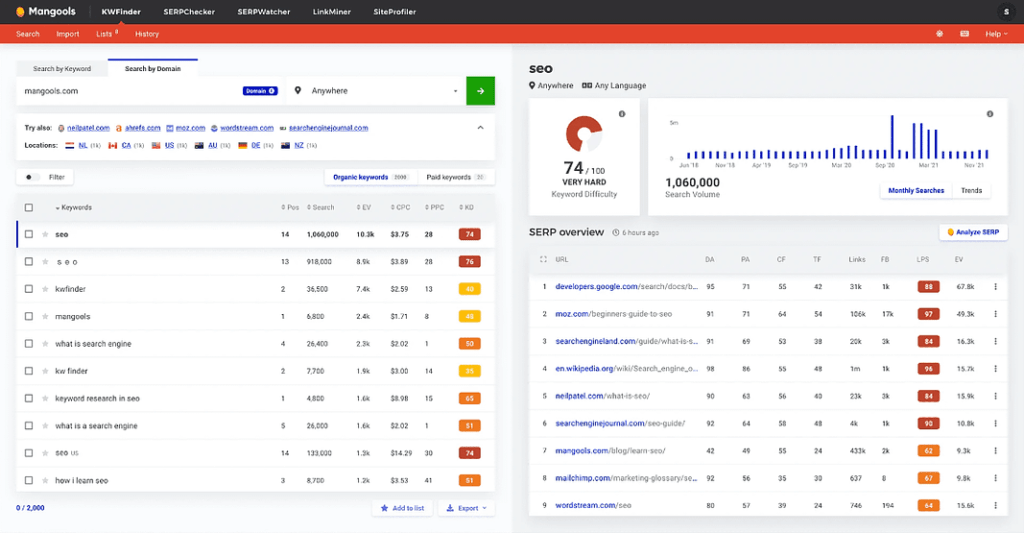
Each keyword listed is also given a “Keyword Difficulty” or “KD” rating. This is calculated from Link Profile Strength using a system created by Mangools, the creator of the KWFinder SEO tool. Keywords are rated on a scale of 0-100, with 0 being the least difficult and 100 being the most difficult. The KD is highlighted in red, yellow, or green, so you can see which keywords are easy to rank for at a glance.
KWFinder does offer premium plans, but visitors to the KWFinder site can search for two keywords per day without signing up. You can also register for a free SEO plan with up to five keyword searches per day. This is adequate enough to suit the search engine optimization needs of many small business websites.
3. Chrome DevTools
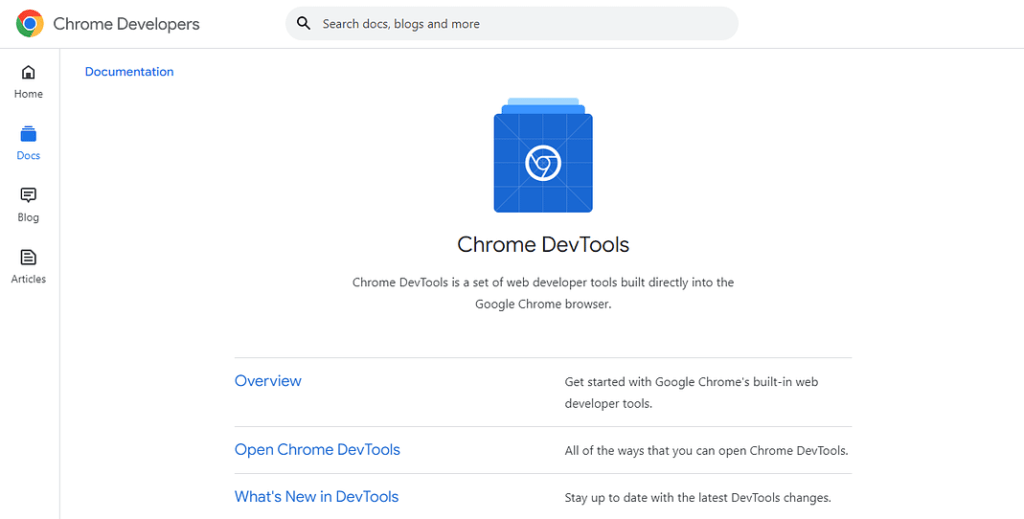
The Chrome DevTools is a suite of web development and debugging tools built right into the Chrome browser. They include an elements panel (which enables you to manipulate your site’s CSS and see how the changes look in real time), a console that provides you with real-time diagnostics, and a networks section with insights regarding your site’s performance, among many others.
However, our primary interest lies with the Chrome DevTools dedicated to providing page performance and loading speed insights. To gain access to these free SEO tools you must first install Google Chrome, then head to the site you’ll be testing. Right-click anywhere on the page, select the Inspect option, and once there, click on the Network tab. Finally, press the F5 key to begin your first test:
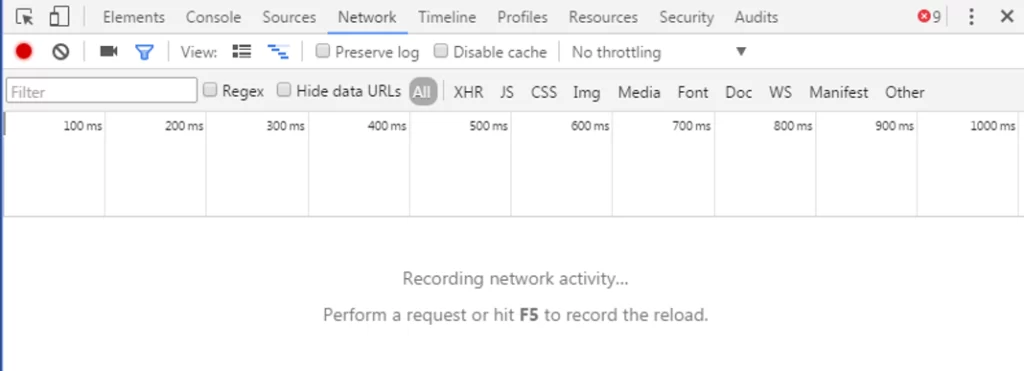
Once the test is complete, you’ll be presented with a list of every single request made to the site and how long it took to complete, as well as an overall loading time. This list will show you which elements need to be optimized, but the usual suspects tend to be images, CSS, and JavaScript. We covered how to reduce image sizes to improve site speed in a previous article, and both CSS and JavaScript can be easily dealt with too, by using a suitable minification plugin.
4. SimilarWeb

Fourth on our list of the best free SEO tools for WordPress is SimilarWeb, a platform that has now been widely accepted as the de facto alternative to Amazon Alexa (which was discontinued in 2022). SimilarWeb is even turning out to be better than Alexa, as it generates deeper website insights for free.
Not only does it rank websites in terms of relative popularity, but it also reveals their web performance analytics. You can count on it for valuable intel on your competitors’ traffic and engagement metrics, as well as audience demographics, keyword performance, geographical profiles, and audience sources.
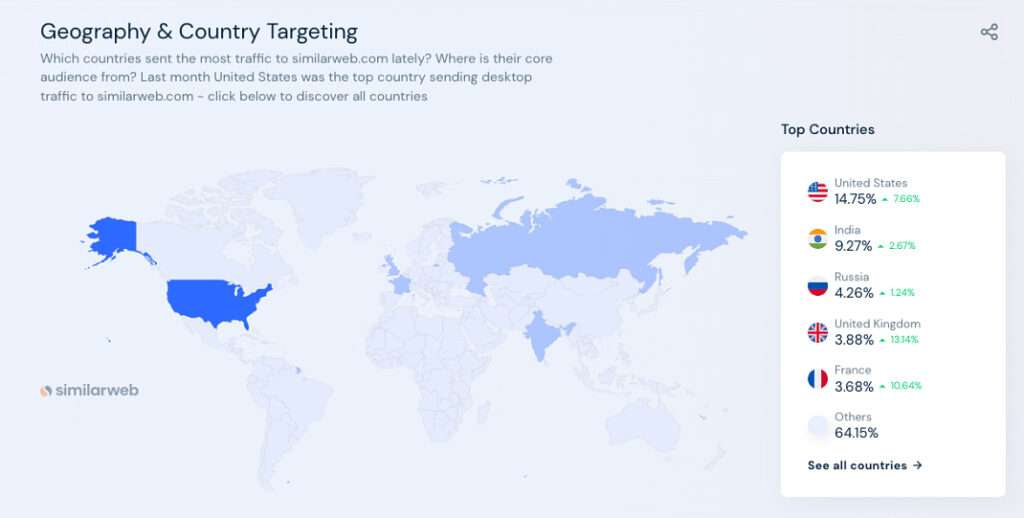
SimilarWeb’s premium version offers so much more. But, since this roundup is all about free SEO tools, we’ll limit ourselves to what’s available at no charge.
The free insights can be accessed in a visual format on SimilarWeb’s main site or browser extension. They include:
- Website ranking in the form of global, country, and category ranks.
- Traffic analytics showing total site visits per month, bounce rate, and pages per visit.
- Geographical data specifying the share of visitors from leading sources.
- Audience demographics such as age and gender distribution.
- Amount of traffic share for each of the top keywords and marketing channels.
And so forth.
You can use these insights to identify the best traffic sources, audiences, and channels to target as part of your SEO strategy.
5. Google Keyword Planner

In Google’s suite of free SEO tools, the Keyword Planner is the standout option when it comes to keyword research. It’s built to help you analyze keywords according to their search volume data, historical trends, level of competition, and relevance.

With these SEO insights in hand, you can quickly select highly-performing keywords for your WordPress posts. The search keywords can also be used in conjunction with the Yoast SEO plugin – which is yet another free SEO tool – to help improve your Google rankings.
6. Google Trends
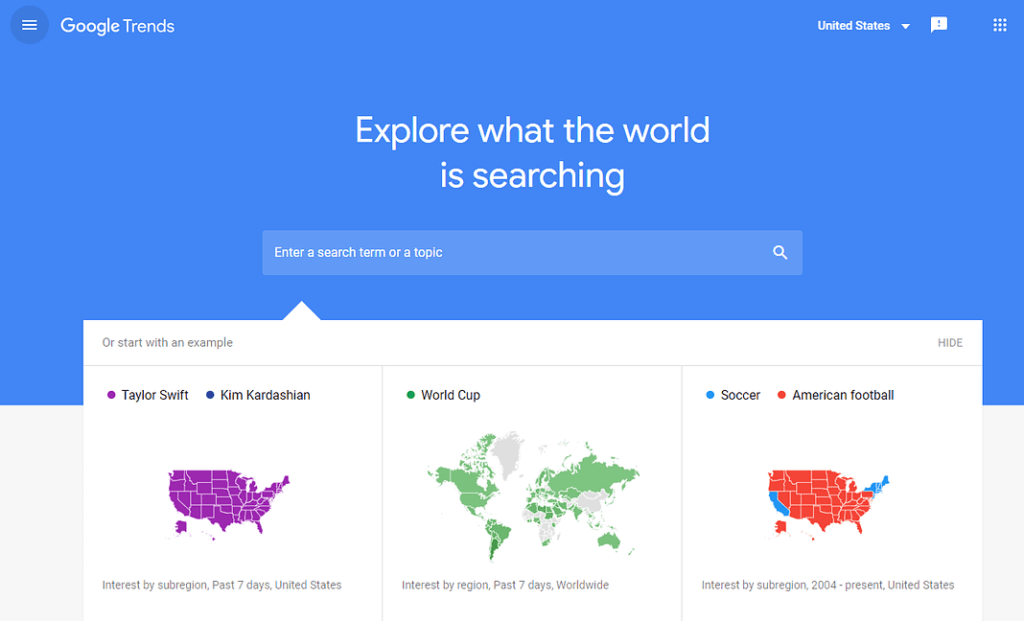
Google Trends is a powerful free SEO tool all by itself, but it shines when used alongside the Google Keyword Planner.
While the planner identifies potential future keywords for your content, Google Trends provides you with hard data about the level of audience interest in the keywords. You can even zero in on specific regions across the globe, as well as run multiple keywords at once to compare their interest levels.
All these valuable insights are drawn from Google’s vast database of search histories, which is the standard resource that powers most of the free SEO tools from the company.
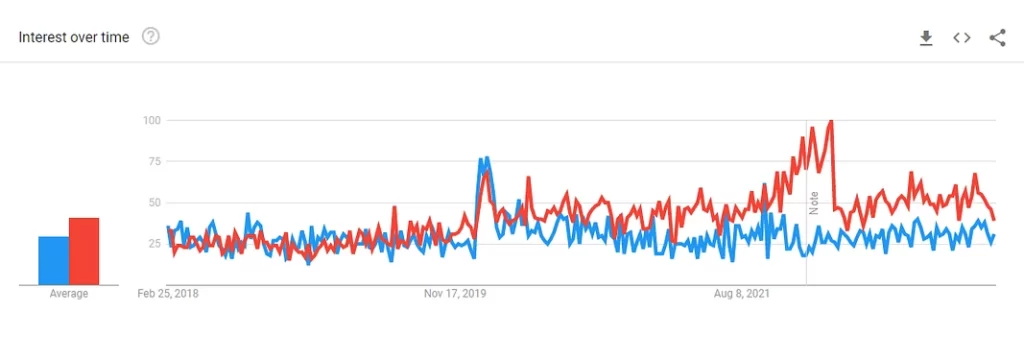
The historical trends here can be an influential factor when determining the viability of keywords.
For example, did you know that audience interest in WordPress themes tends to peak each year around January and February? A savvy WordPress blogger would probably respond to the findings by scheduling their theme roundup for publishing right before the peak season.
7. Keywords Everywhere

Keywords Everywhere is a free SEO extension for Chrome and Firefox that integrates directly with Google Search, Google Analytics, eBay, and other major websites to show you keyword information in real time. But, for the purposes of this article, we’ll only focus on how Keywords Everywhere integrates with Google Search.
Every time you search for something on Google, Keywords Everywhere will present you with two lists of search keywords: one outlines automatically-generated relevant keywords, while the other highlights alternative keywords that are popular with the search audience. What’s more, the free SEO tool reveals the search volumes, CPC (Cost-Per-Click), and Competition levels for each of the keywords.
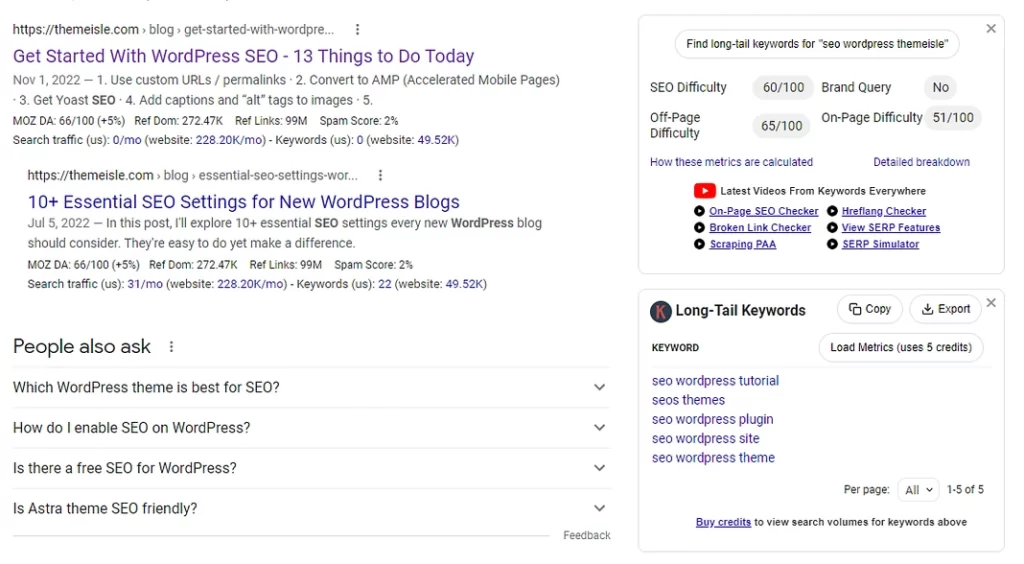
Keywords Everywhere can be said to be one of the best free SEO tools for discovering fresh focus keywords that you could use on your WordPress blog. At least you’ll be able to come up with SEO-friendly article ideas from the outset, rather than trying to force an ill-fitting keyword onto an idea you’ve already written about.
Final thoughts on the top free SEO tools for WordPress 🧐
To boost your Google rankings, you’ll need patience and perseverance. You won’t see results overnight, even if you’re doing everything correctly.
With these free SEO tools, however, the journey can be easier and much shorter. You’ll be able to choose the right keywords, audit your website, speed up your web pages, track your SEO strategies, and target the right audiences.
And with that, let’s recap the seven free SEO tools for WordPress:
- Pingdom Speed Test: The free SEO tool for analyzing your site’s speed.
- KWFinder: An easy way to assess how difficult it will be to rank for keywords you’re interested in, and what alternative keywords might be easier to rank for.
- Chrome DevTools: The free SEO tool for obtaining in-depth performance data.
- SimilarWeb: The best free SEO tool for competitive intelligence and traffic analytics.
- Google Keyword Planner: A great SEO tool for researching keywords.
- Google Trends: A free SEO tool for refining your keywords using historical trends.
- Keywords Everywhere: Great SEO software for finding keywords naturally as you surf the web.
Are there any other free SEO tools that you would recommend to other WordPress users? Share them with us in the comments section below!